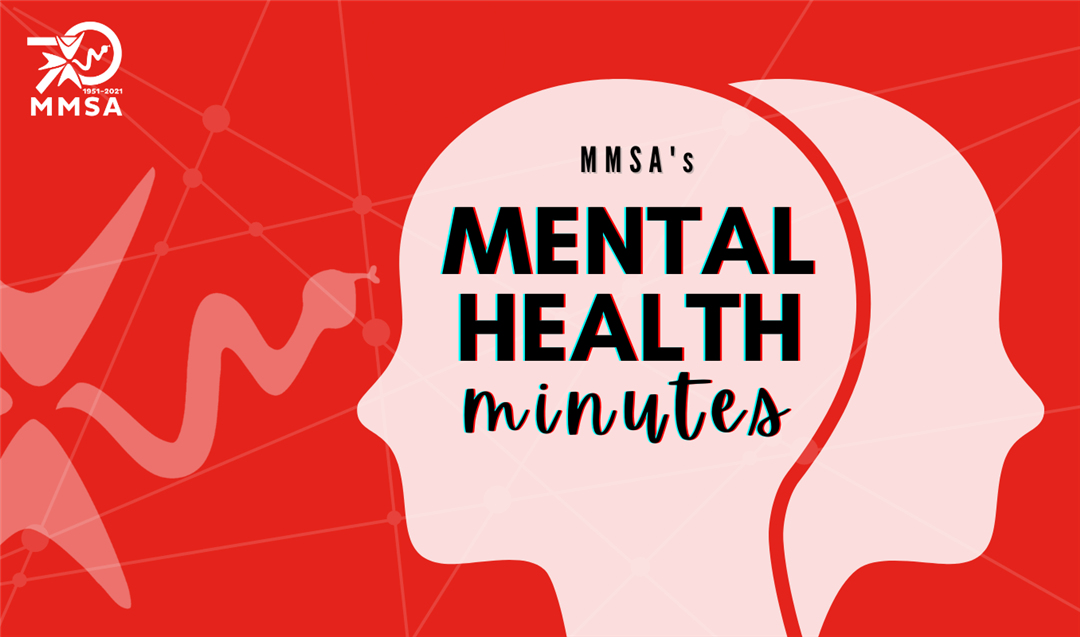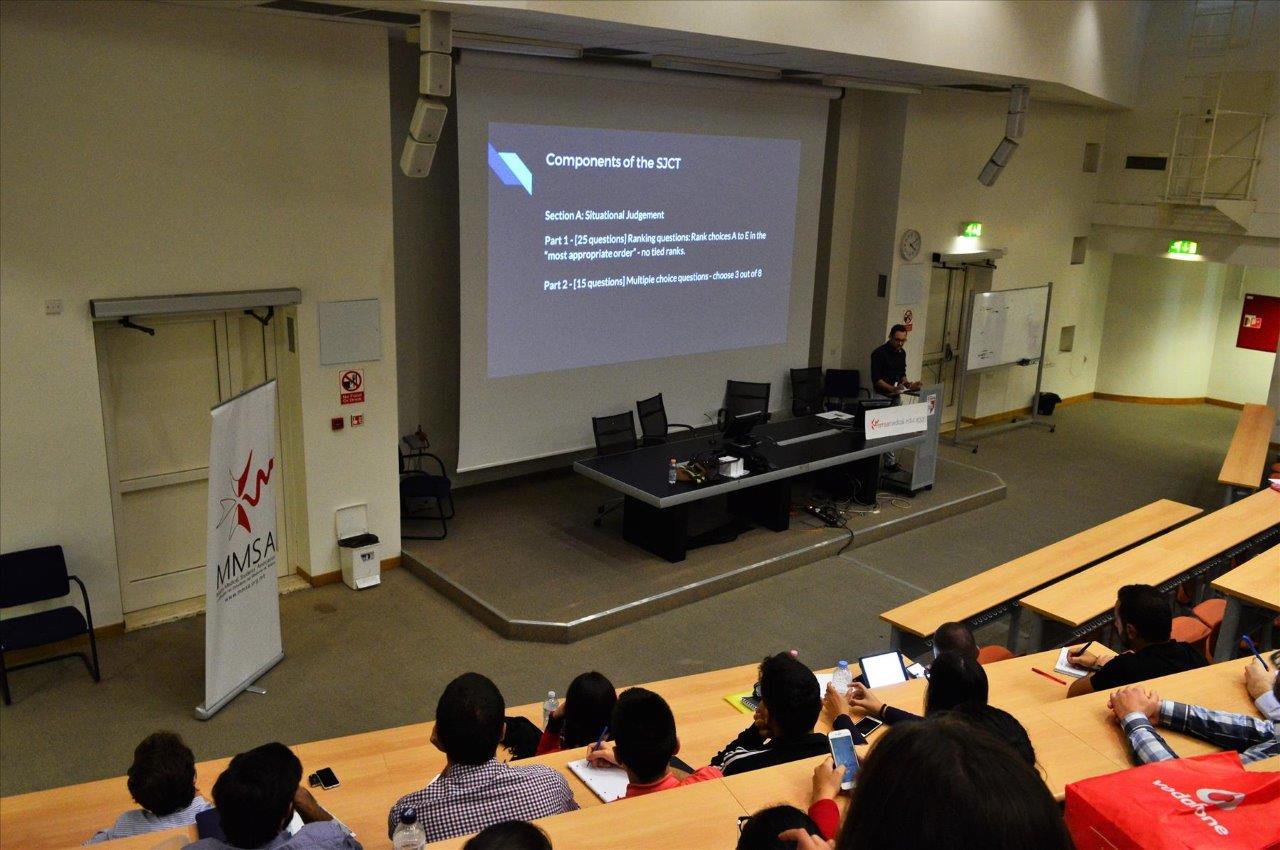Mental Health Minutes - What is depression?
Depression, also clinically known as Major Depressive Disorder, is one of the leading mental disorders. Globally, there are more than 264 million people of all ages suffering from depression (WHO, 2020).
Despite the frequency of the mental disorders, it may be difficult for individuals to tell whether they are suffering from depression or short-lived sadness. It is essential to understand the difference between the two, as well as the signs and symptoms of Major Depressive Disorder, in order to seek guidance and treatment (WHO, 2020).
Lasting for at least two weeks, depression can be a debilitating condition affecting the individual’s day-to-day activities, relationships, thoughts and overall satisfaction (Fitzgerald, 2019). One may develop depression unexpectedly or may be triggered by personal loss or an event in the individual’s life. Depression itself can promote dysfunction and comorbid anxiety, worsening the individual’s life situation, causing further depressive symptoms (WHO, 2020).
Types of depression
There are different types of depression, and some which develop during specific circumstances; these include:
- Persistent depressive disorder, also known as dysthymia, is when the depressed mood lasts for at least two years.
- Perinatal depression occurs in women prior to birth (antenatal depression), or after birth (postnatal depression). A relatively mild depressive mood that commonly occurs postnatally commonly occurs, known as ‘baby blues’ which typically lasts two weeks. However, perinatal depression can become major depression during this period which makes it very difficult for a new mother to carry out daily care activities. The symptoms of this type of depression do not differ from Major Depressive Disorder, however, they can have an effect on the mother-infant relationship, as well as on the child’s emotional and cognitive development.
- Psychotic depression is when an individual suffers from both severe depression associated with psychotic symptoms, usually in the form of negative experiences.
- Seasonal affective disorder is a form of depression that is related to changes in seasons, therefore usually starting and ending around the same period annually. Typically, it occurs during the winter months and subsides as spring and summer come along. However, this varies per individual.
- Bipolar disorder causes the individual to have periods of extremely low moods, bipolar depression, whilst other periods of extreme high moods, known as hypomania. Further elation in mood presents with mania, which is incompatible with daily functioning and can be associated with psychotic symptoms.
- Disruptive mood dysregulation disorder is a condition during childhood causing extreme anger, irritability and intense outbursts causing severe impairment.
- Premenstrual dysphoric disorder is a severe form of premenstrual syndrome which also occurs one to two weeks prior to the initiation of menstruation and subsides a few days as it begins. It causes abnormal reactions to normal hormonal changes after ovulation which can cause severe depression, irritability and tension.
(National Institute of Mental Health, 2018; Cherry, 2021; Office on Women’s Health, 2018)
Signs and symptoms of depressive disorders
As with many other illnesses, the earlier treatment is initiated, the better the outcome and prevention of recurrence, therefore, it is essential to recognise the disorder as early as possible. People with depressive disorder have five or more of the following symptoms, including at least one of the first two symptoms, almost every day for at least two consecutive weeks.
- Lowering of mood
- Unresponsive to circumstances
- Reduction of energy
- Agitation
- Decrease in activities
- Capacity for enjoyment, interest and concentration decreases
- Loss of interest and pleasurable feelings
- Tiredness even after minimum effort
- Sleep disturbances
- Appetite diminished
- Weight loss
- Loss of libido
- Self-esteem and self-confidence are reduced
- Feelings of guilt or worthlessness
(ICD-10 Version, 2016)
What are the risk factors for depression?
Depression can be present at any age; however, it often begins in adolescence, 20s and 30s. More women are diagnosed with depression; however, this may be partly due to more females seeking treatment than males (Mayo Clinic, 2019).
Some risk factors which increase the risk of developing or triggering depression include:
- Family history of depression, bipolar disorder, alcoholism or suicide
- History of other mental disorders
- Suffering from serious or chronic illnesses such as stroke, hypothyroidism, some cancers
- Side effects of certain medications
- Environmental factors such as the constant exposure to abuse, neglect, poverty
- Lack of exposure to light during winter months
- Traumatic and stressful events
- Biochemistry (level of certain chemicals in the brain)
- Certain personality traits such as low self-esteem and being too dependent, pessimistic, self-critical
- Alcohol or drug abuse
(Mayo Clinic, 2018)
Available treatments
Fortunately, the disorder is treatable with many people recovering from depression and leading a productive and satisfying life. There is a range of treatments available, from psychotherapy to medical treatments (American Psychiatric Association, 2020).
Psychological therapies
People suffering from depression often feel hopeless and worthless. Cognitive Behaviour Therapy (CBT) is based on modifying dysfunctional emotions by helping the individual recognise the negative and irrational thoughts to change them into more realistic ones and to respond to challenging situations in a more effective manner (Mayo Clinic, 2019).
Behaviour activation often forms part of CBT, it is a basic coping strategy that focuses on increasing the level of activity and pleasure in the individual’s life, teaching the person that behaviour can affect their mood. The aim is to identify specific goals, for a period of time, and work towards achieving them, which should be practised particularly when feeling anxious or depressed (Tull, 2020).
Mindfulness-based cognitive therapy utilises both cognitive therapy and mindfulness through meditation and breathing exercises, amongst others. This aims to provide the space for the individual to focus solely on the present moment, breaking away from negative thoughts. This allows one time to digest what they are experiencing without putting emphasis on trying to change it (Sipe et al., 2012).
Interpersonal psychotherapy allows the individual to communicate better with others and address any conflicts which may be contributing to depression, as well as deal with grief and changes in relationships (Holland, 2021).
Medical treatments
Brain chemistry can be a possible contributing factor to one’s depression and may influence one’s treatment. Depression causes a loss of connections between nerve cells in certain areas of the brain. Antidepressant medications aim to modify brain chemistry and are thought to work by aiding the production of new nerve cells and connections between cells. They are commonly prescribed to people with moderate to severe depression and typically show improvements within a month of initiating medication (American Psychiatric Association, 2020). Certain antidepressants can also be prescribed alongside other psychological treatments or in combination with other medications such as mood stabilisers and antipsychotic drugs (Beyond Blue, 2021).
For individuals who did not respond to other procedures, brain stimulation therapies may be helpful. Electroconvulsive therapy involves electrical currents being passed through the brain to alter the effect of neurotransmitters and relieve depression. Transcranial magnetic stimulation involves holding a strong magnet over the scalp which sends brief magnetic pulses to stimulate nerve cells in certain areas related to mood regulation and depression (Mayo Clinic, 2018).
Lifestyle changes
Alongside depression treatment, there are also other lifestyle changes that can be implemented which will further aid in depression recovery from depression.
These can include:
- Exercising: according to Mayo Clinic, 30 minutes a day can aid in alleviating depression, increases the production of natural antidepressants, reduces stress, boost self-esteem and aids in restful sleep
- Healthy eating by cutting down on junk food and increasing fatty acids, amino acids and complex carbohydrates into one’s diet
- Sleep: lack of sleep is a common complication of depression; therefore, it is important to develop a consistent sleep schedule to improve the quality and quantity of sleep
- Meditation: this practice has been shown to alleviate stress and anxiety which may accompany depression, as well as aid in providing a calm mindset prior to sleeping. (Legg, 2016)
How can I tell if I or someone I know is depressed?
A person who is suffering from depression may seem slower in moving and thinking and have increased agitation. They may show a lack of interest and attention to their personal hygiene and in activities, they may have previously enjoyed. The individual would typically look sad, anxious and irritable, and may have a hopeless outlook on life. Mild depression may be easily hidden from others, whilst on the other hand, people with severe depression may be emotionally unresponsive (Legg, 2019).
Unfortunately, it may be difficult to recognise if someone is suffering from depression, and they can therefore be easily labelled as lazy, self-centred or being incompetent. This would only reinforce the depressed feelings and beliefs of the worthlessness of the individual.
How can I help friends and family who have depression?
Although you yourself would be unable to provide them with the professional advice and treatment they may require, you can provide the support they may require during this time. Provide a comfortable space and identify the proper time to allow them to speak to you and listen and communicate with them in a non-judgemental manner by validating their feelings and setting aside your reactions to allow the person to feel that they are being heard and understood.
The individual may not recognise they are suffering from depression or unsure of how to seek help. Encourage other support systems and professional help and continue showing support and encouragement whilst attending therapy.
It is essential to set boundaries and practice self-care. Whilst helping someone with a mental health illness we unknowingly may put all our energy into supporting the individual which would be of detriment to our own mental and physical health and may result in burnout and frustration. It is important to recognise that if you are not healthy, it is very difficult to care for others (Legg, 2019).
If I or someone I know is struggling with depression, who can I reach out to for help?
Initially, you may feel more comfortable opening up to someone whom you trust, whether a family member or a friend. If this does not seem to help, it is then suggested to speak to a professional. A variety of health professionals can provide help to someone with depression, this can be your general practitioner (GP), or professionals specialised in the field of mental health, including psychiatrists, psychologists, counsellors, occupational therapists or social workers etc.
There are also free services and resources available through which you can seek help and speak to professionals about what you are going through. These include:
● Free counselling sessions at the Health and Wellness Centre at the University of Malta
- Richmond Foundation Helpline 1770 – this helpline is available 24 hours, 7 days a week.
- Richmond Foundation OLLI chat - chat-based mental health service (https://olli.chat/) available 24 hours, 7 days a week.
- Kellimni.com – This website gives you the opportunity to seek help from a professional anonymously.
● Aġenzija Appoġġ Helpline 179 – this helpline serves as a national service for people who are in times of difficulty or crisis
These services are beneficial for people who feel that their mental health is under pressure, and one should not be afraid to seek help.
In Malta, mental health services are free of charge. The centres or clinics that offer their services to mental health care are located in Cospicua, Floriana, Gzira, Mosta, Mtarfa, Paola and Qormi. It is recommended that one calls the respective clinic for an appointment.
|
Health Centre |
Contact Number |
Day of the Week |
Schedule |
|
Bormla |
23972330/ 21662088 |
Monday to Friday |
7:30am-5:30pm On Fridays till 3pm |
|
Gzira |
21344766/ 21337245 |
Tuesday and Wednesdays |
7:30am-5pm |
|
Kirkop |
21681267 |
Tuesdays, Wednesdays and Thursdays |
|
|
Mosta |
21424969 |
Monday to Thursday |
7:30am-5pm |
|
Qormi |
21441317/ 21440170 |
Monday to Friday |
7:30am-5pm On Fridays till 3pm |
|
Floriana |
21220454/ 21250015 |
Monday to Friday |
7:30am-3pm |
|
Mtarfa |
21456750/ 21454917/ 21456758 |
Monday to Friday |
7:30am-3pm |
|
Paola |
21821566/ 21821562 |
Monday to Friday |
7:30am-3pm |
Written by Rachel Anne Muscat Baron and reviewed by Dr Daniel Vella Fondacaro
References
WHO (2020). Depression. Available at: https://www.who.int/news-room/fact-sheets/detail/depression
Jenny Fitzgerald (2019). The difference between depression and sadness. Medical News Today. Available at: https://www.medicalnewstoday.com/articles/314418
National Institute of Mental Health (2018). Depression. Available at: https://www.nimh.nih.gov/health/topics/depression/
Kendra Cherry (2021). An Overview of Disruptive Mood Dysregulation Disorder. Verywell Mind. Available at: https://www.verywellmind.com/disruptive-mood-dysregulation-disorder-4774447
Office on Women’s Health (2018). Premenstrual dysphoric disorder. Available at: https://www.womenshealth.gov/menstrual-cycle/premenstrual-syndrome/premenstrual-dysphoric-disorder-pmdd
ICD-10 Version (2016). Depressive episode. Available at: https://icd.who.int/browse10/2016/en#/F32
Mayo Clinic (2019). Depression in women: Understanding the gender gap. Available at: https://www.mayoclinic.org/diseases-conditions/depression/in-depth/depression/art-20047725
American Psychiatric Association (2020). Depression. Available at: https://www.psychiatry.org/patients-families/depression/what-is-depression
Mayo Clinic (2019). Cognitive behaviour therapy. Available at: https://www.mayoclinic.org/tests-procedures/cognitive-behavioral-therapy/about/pac-20384610
Matthew Tull (2020). 8 Tips for Using Behavioral Activation to Treat Depression. Verywell Mind. Available at: https://www.verywellmind.com/increasing-the-effectiveness-of-behavioral-activation-2797597
Walter E B Sipe, Stuart J Eisendrath (2012). Mindfulness-based cognitive therapy: theory and practice. Available at:https://pubmed.ncbi.nlm.nih.gov/22340145/#affiliation-1
Kimberly Holland (2021). Interpersonal Therapy. Healthline. Available at: https://www.healthline.com/health/depression/interpersonal-therapy
Beyond Blue (2021). Medical treatments for depression. Available at: https://www.beyondblue.org.au/the-facts/depression/treatments-for-depression/medical-treatments-for-depression
Timothy J. Legg (2019). Signs of Depression. Healthline. Available at: https://www.healthline.com/health/depression/recognizing-symptoms
Timothy J. Legg (2019). How to Help a Depressed Friend. Healthline. Available at: https://www.healthline.com/health/how-to-help-a-depressed-friend#listen
Timothy J. Legg (2016). Lifestyle Changes for Depression. Healthline. Available at: https://www.healthline.com/health/depression/lifestyle-changes-overview







